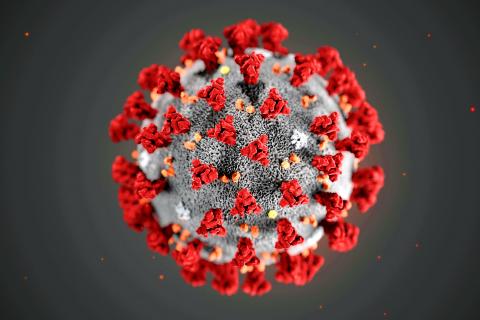Humans likely synthesized COVID-19, although more studies are needed to be certain, National Taiwan University (NTU) public health researcher Fang Chi-tai (方啟泰) said yesterday as he cited the opinions of other researchers.
During his presentation at a disease-prevention education seminar held at NTU by the Taiwan Public Health Association — which invited several public health study professors and researchers to give presentations that were also broadcast live via Facebook — Fang addressed numerous hypotheses that have been raised by foreign researchers, including the possibility that the virus was leaked from the Wuhan Institute of Virology.
He has heard of many US and Europe-based researchers who are asserting that the virus was inextricably linked to the institute, Fang said, adding this assertion was highly possible as the facility’s biosafety level 4 laboratory houses samples of SARS, Ebola and other deadly viruses.

Photo: Alissa Eckert, MS; Dan Higgins, MAM/CDC/Handout via Reuters
Given China’s poor track record with lab safety management and overall lab culture, it is highly likely that a virus escaped from the facility, he cited the opinions of other researchers as saying.
Analyses of COVID-19 have shown that is has a 96 percent genetic similarity with an RaTG13 bat virus at the institute, he said.
While viruses need to be at least 99 percent similar to call them “the same,” it is the differences in particular that have led researchers to speculate that COVID-19 was manufactured by modifying RaTG13, he said.
A French research team that examined the gene sequence of COVID-19 has discovered that it has four more amino acids than other coronaviruses, he said, adding that this makes its transmission easier.
The findings have led some in the research community to speculate about whether China’s scientists intended to develop a virus more difficult to contain than SARS, he said.
If that was their intent, they appeared to have succeeded, Fang added.
Mutations of viruses that occur naturally only result in small, singular changes, he said, adding that one would not normally see a naturally mutated virus suddenly take on four amino acids.
While such a large mutation is not impossible, it is highly unlikely, he said.
However, only an internal administrative review at the institute could rule out whether the virus was manufactured there, he said.
Such an investigation would require access to lab records, which is unlikely to happen in the short term, he added.
Determining the source of the coronavirus has important implications for epidemiology, Fang said, adding that if the virus does not occur in nature, then it is likely to be entirely stamped out.
This is quite different from forms of influenza, which cannot be easily eradicated, because they are part of the ecosystem, Fang added.

Taiwan is to commence mass production of the Tien Kung (天弓, “Sky Bow”) III, IV and V missiles by the second quarter of this year if the legislature approves the government’s NT$1.25 trillion (US$39.78 billion) special defense budget, an official said yesterday. Commenting on condition of anonymity, a defense official with knowledge of the matter said that the advanced systems are expected to provide crucial capabilities against ballistic and cruise missiles for the proposed “T-Dome,” an advanced, multi-layered air defense network. The Tien Kung III is an air defense missile with a maximum interception altitude of 35km. The Tien Kung IV and V

The disruption of 941 flights in and out of Taiwan due to China’s large-scale military exercises was no accident, but rather the result of a “quasi-blockade” used to simulate creating the air and sea routes needed for an amphibious landing, a military expert said. The disruptions occurred on Tuesday and lasted about 10 hours as China conducted live-fire drills in the Taiwan Strait. The Civil Aviation Administration (CAA) said the exercises affected 857 international flights and 84 domestic flights, affecting more than 100,000 travelers. Su Tzu-yun (蘇紫雲), a research fellow at the government-sponsored Institute for National Defense and Security Research, said the air

A strong continental cold air mass is to bring pollutants to Taiwan from tomorrow, the Ministry of Environment said today, as it issued an “orange” air quality alert for most of the country. All of Taiwan except for Hualien and Taitung counties is to be under an “orange” air quality alert tomorrow, indicating air quality that is unhealthy for sensitive groups. In China, areas from Shandong to Shanghai have been enveloped in haze since Saturday, the ministry said in a news release. Yesterday, hourly concentrations of PM2.5 in these areas ranged from 65 to 160 micrograms per cubic meter (mg/m³), and pollutants were

Taiwan’s armed forces have established response protocols for a wide range of sudden contingencies, including the “Wan Chun Plan” to protect the head of state, the Ministry of Defense (MND) said today. After US President Donald Trump on Saturday launched a series of airstrikes in Venezuela and kidnapped Venezuelan President Nicolas Maduro, concerns have been raised as to whether China would launch a similar “decapitation strike” on Taiwan. The armed forces regularly coordinate with relevant agencies and practice drills to ensure preparedness for a wide range of scenarios, Vice Minister of National Defense Hsu Szu-chien (徐斯儉) told reporters before a